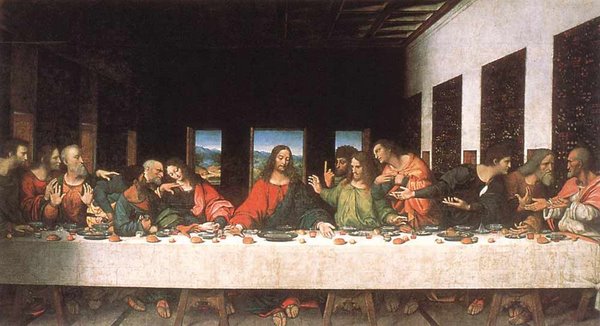 I have an intellectual axe to grind today. Well, actually I have two, but I’m going to avoid one of them and rant about the other. What I’d like to discuss is a skill that the majority of the population is completely lacking: critical thinking. Yes, I’ve spoken about this a very many times, but today I’m going to illustrate the pitfalls of going through life without thinking critically about what you read and hear by using an example from one of my classes last year.
I have an intellectual axe to grind today. Well, actually I have two, but I’m going to avoid one of them and rant about the other. What I’d like to discuss is a skill that the majority of the population is completely lacking: critical thinking. Yes, I’ve spoken about this a very many times, but today I’m going to illustrate the pitfalls of going through life without thinking critically about what you read and hear by using an example from one of my classes last year.In one of my Mediaeval history classes last year there was a student who just didn’t have a clue. A complete account of the most classic moments involving her stupidity would take far too long, so I’ll use one event to demonstrate my point. In order to understand the thoughts and behaviour of people who lived in the Middle Ages, one must understand that the thought-world they lived in was dominated by religion. Thus, we started the course by reading some of the more important sections of the Bible. When we got to the part about Adam and Eve this clueless student put her hand up and mentioned that the fateful apple that doomed the couple is an ancient pagan symbol for wisdom, and suggested that this story may thus reflect an earlier, decidedly pagan, root of early Christianity.
At this point I’d like to pause, and ask if you can see what is wrong with her analysis? Are there any questions you can think to ask about her evidence, argument, or conclusion? Think about it for a few seconds before I continue.
This student’s analysis reveals a complete lack of critical thinking skills. This deficiency, aside from making her look stupid, also caused her argument to fall very wide of the mark. In order to prove that the “pagan apple=wisdom” somehow found its way into the Bible there is a long series of questions that need to be answered so that a chain of causation can be established. Without proof of a causal chain, no historical argument has any value.
So, exactly which ancient pagans used the apple as a symbol for wisdom? Where and when did they live? How could they have had any connection with the man (yes, it was almost certainly a man) who wrote down the Adam and Eve story? Unless you can answer all these questions, and more, such an argument is useless. Well, this student revealed her ignorance by not being able to answer any of the questions, though if you knew her you would not have been surprised. Thus, the irrelevance of her idea was made abundantly clear.
Now, let’s try and answer these questions and see if we can come to a real conclusion here. Is there a connection? Did she just miss it through her inability to examine the evidence? Well, though I am no expert on pre-historical Europe, or the thousands of groups of people who lived in all of its various regions, I am aware that certain ancient Celtic groups did indeed use the apple as a symbol for wisdom. But, since at least 99% of the world’s population still thinks the word “Celtic” refers to an ethnicity, you will quickly meet a discouraging wall of ignorance if you follow this line of inquiry. From what I can tell, the specific groups in question lived in either France or Britain. Unfortunately, this actually covers many dozens of different ethnic and cultural groups who all happened to speak a related group of languages, which we now refer to as Celtic (or Gaelic, which is closer to the actual word). There was, however, a group of Celtic-speaking people who were settled in Asia Minor (modern Turkey), who may or may not have used this exact symbol.
Now, the people who wrote this part of the Bible belonged to a semi-nomadic, Semitic-speaking tribe that was eventually referred to as the “habiru”, or Hebrews. They lived in many areas of the Middle East at this time, though probably not in Asia Minor. Is it possible that the European pagans and the Aramaic monotheists met up and assimilated each other’s symbols? Probably not. Though I won’t rule it out, I would certainly laugh at anyone who tried to make this argument, even if they referred to the group of Celts in Turkey. Thus, the student’s conclusion is easily proven wrong with the application of only a tiny fraction of critical thought.
However, her argument is also disproved by following a completely different line of questioning. Had she merely asked a few more questions about the “apple” she may even have discovered it. Here are my questions: Was the Bible written in English? What language was it written in? When, how, and by who was it translated into English? Does the word apple mean the same thing in these languages?
Allow me to quickly answer these questions. This section of the Bible was written in ancient Hebrew. Eventually it was translated to Greek and Latin, and from there into Old English, or Anglo-Saxon. From there it was translated, or updated, into Middle English, and now Modern English. Though I’m not sure what the word in question was in the original text, it was translated into Old English as “apple”. However, in Old English there were two words that could have been chosen, since they both meant the same thing. These words were “apple” and “wasten”, and they both meant what the modern word “fruit” means. After 1066 the French-speaking Normans conquered England, and Old English merged with French to create two recognizable languages. First came the French dialect known as Anglo-Norman, and then came what we know as Middle English, Chaucer’s language. By this time the word “wasten” had been replaced with the French word “fruit”, and “apple” had transformed into the word for the specific fruit that we would recognize. This little change in meaning was missed when the Bible was updated, since to whoever was updating it, “apple” was not a foreign word. He probably thought it was referring to a specific fruit rather than the generic fruit that it meant in Old English. Thus, we still see the word as “apple” and think of apples, when we should be seeing the word “fruit”, and we should probably be thinking about peaches or apricots. So, the “apple” that supposedly represents wisdom, isn’t even an apple at all.
Ok, that was a little long-winded, but I hope it gets my point across. The things we think about our history can change drastically if we merely think about them critically. I hope you learned a lesson today, and I really hope you learn how to apply it. Ciao per ora, and keep thinking.























